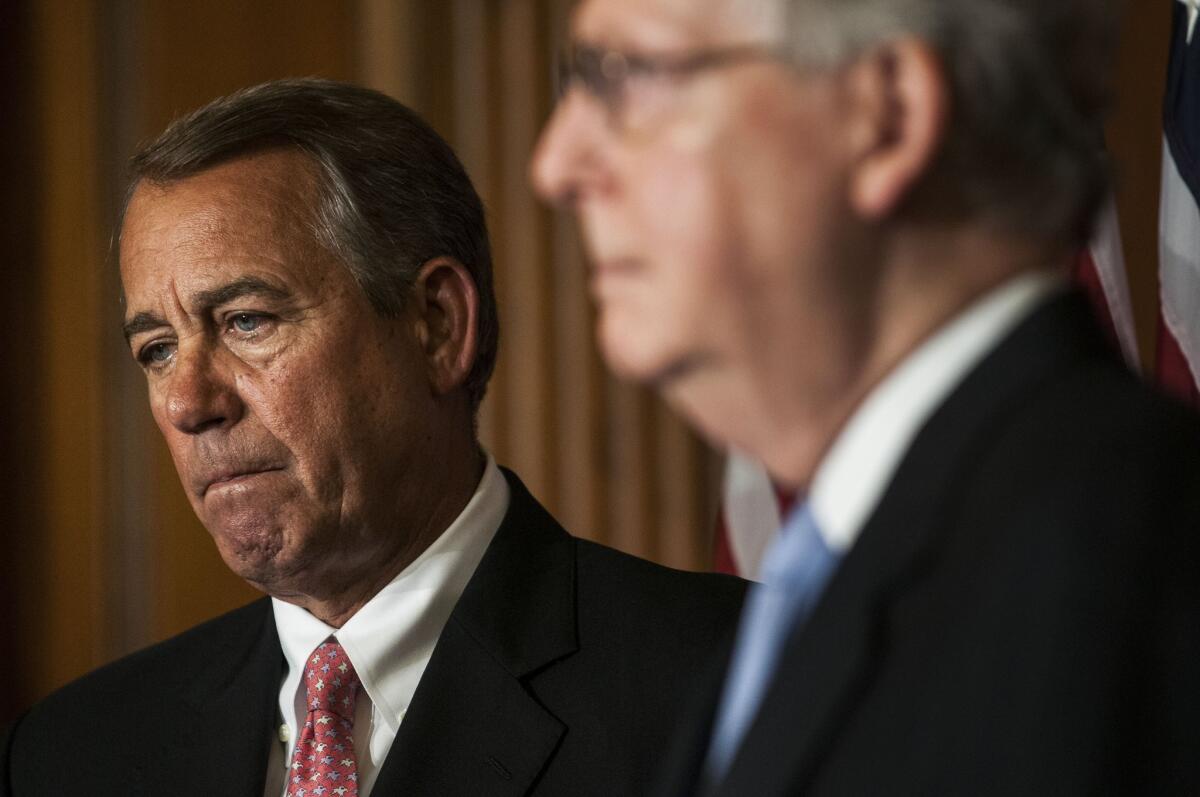Congress’ Republicans pass budget, but that’s the easy part: Showdowns loom

- Share via
Reporting from Washington — Fulfilling a top campaign pledge, Republicans on Tuesday gave final approval to the first budget from Congress in more than five years.
Despite passage of the largely symbolic budget blueprint, Congress faces a rough road ahead in translating that vision into actual spending bills that will satisfy both parties and avoid a government shutdown this fall.
The $3.8-trillion GOP budget blueprint for the fiscal year that begins Oct. 1 is based on beefed-up funding for the military and steep reductions in social programs. But President Obama is all but certain to veto any Republican-backed spending bills that mirror such an approach.
On Tuesday, Republican leaders nevertheless celebrated their accomplishment. The last time the House and Senate passed a budget together was 2010, when Democrats were in charge of both chambers, just as the GOP is today.
“This is something many Americans have been waiting a long time to see,” Senate Majority Leader Mitch McConnell (R-Ky.) said.
The Senate approved the GOP budget by a vote of 51 to 48. All Democrats voted against it, as did two Republicans. The two, Sens. Ted Cruz of Texas and Rand Paul of Kentucky, opposed the plan because it allowed new defense spending without offsetting budget cuts elsewhere. The House approved the package last week.
Republicans took particular pride in producing a document that they say will bring the nation’s spending and revenue into balance by 2025 -- something Washington has not done since the Clinton administration. Democrats counter that the GOP plan achieves a balanced budget only through accounting gimmicks and questionable revenue assumptions.
Passage of the budget also triggers special rules allowing certain subsequent bills to bypass a filibuster in the Senate -- giving Republicans their best chance yet to pass a bill repealing Obama’s healthcare law with a simple majority vote.
The House has passed more than 50 bills repealing the Affordable Care Act, but efforts to advance such a measure have died in the Senate. Although Republicans took control of the Senate in January, their slim majority is not enough to provide the 60 votes needed to avoid a filibuster.
The budget process offers a special opportunity to pass a bill with a simple majority. Republicans are expected to send a bill repealing Obamacare to the president’s desk for the first time.
Democrats used the same special rules in their 2010 budget to ensure final passage of the healthcare law.
Obama has made it clear he would veto any bill that repeals the healthcare law, but Republicans are eager to force a showdown, fulfilling a long-standing promise to try to unwind the president’s signature program.
Sen. Michael B. Enzi (R-Wyo.), chairman of the Senate Budget Committee, said the GOP budget presented a “historic opportunity” to put the nation on a “better course.”
Democrats have roundly rejected the Republican plan to cut the social safety net while boosting Pentagon spending above already approved levels.
Sen. Bernie Sanders, the Democratic presidential candidate from Vermont and the party’s top representative on the Budget Committee, called the Republican budget “an absolute disaster for the working families of this country.”
“It is so bad, it is so far out of touch from where the American people are,” Sanders said.
Passage of a budget had become a badge of honor for Republicans, who routinely criticized Democrats for failing to do so. Democrats had let budgeting lapse in recent years because some lawmakers were at odds with Obama’s budget details, including his proposed tax hikes.
Even though the budget from Congress does not carry the force of law, it will guide Republican spending bills coming this spring and summer, which are needed to keep the government running.
Beyond Obama’s veto threats, the spending bills threaten to pose problems for Republicans as the party splinters along familiar divisions between defense hawks and those seeking to slash government spending.
Last week, House Republicans struggled to approve one of the first spending bills -- a popular measure to fund military construction and the Veterans Administration. Fiscal conservatives balked over the increased defense spending.
The deficit sharks criticized their party for piling on new military money without paying for it by offsetting spending elsewhere.
The military bill was ultimately approved after conservative lawmakers relented, but their opposition put Republican leadership on notice that more battles may be coming over what fiscal watchdogs view as excessive spending.
Even if Republicans can send their spending bills to the president’s desk, Obama will probably veto those that don’t also provide increased funding for Democratic priorities.
Obama’s own budget had proposed easing the so-called sequester cuts mandated under a previous deal that slashed spending across the military and domestic accounts. His proposal would raise spending for the military and social programs.
Both Republicans and Democrats have complained about the steep reductions, and leaders have talked about reopening negotiations to find a compromise.
For the latest from Congress follow @LisaMascaro.
More to Read
Get the L.A. Times Politics newsletter
Deeply reported insights into legislation, politics and policy from Sacramento, Washington and beyond. In your inbox twice per week.
You may occasionally receive promotional content from the Los Angeles Times.











